Action Comics #1050 just changed the Superman game
The writers of Action Comics #1050 discuss Lex Luthor's plan and how it alters Superman's dynamics
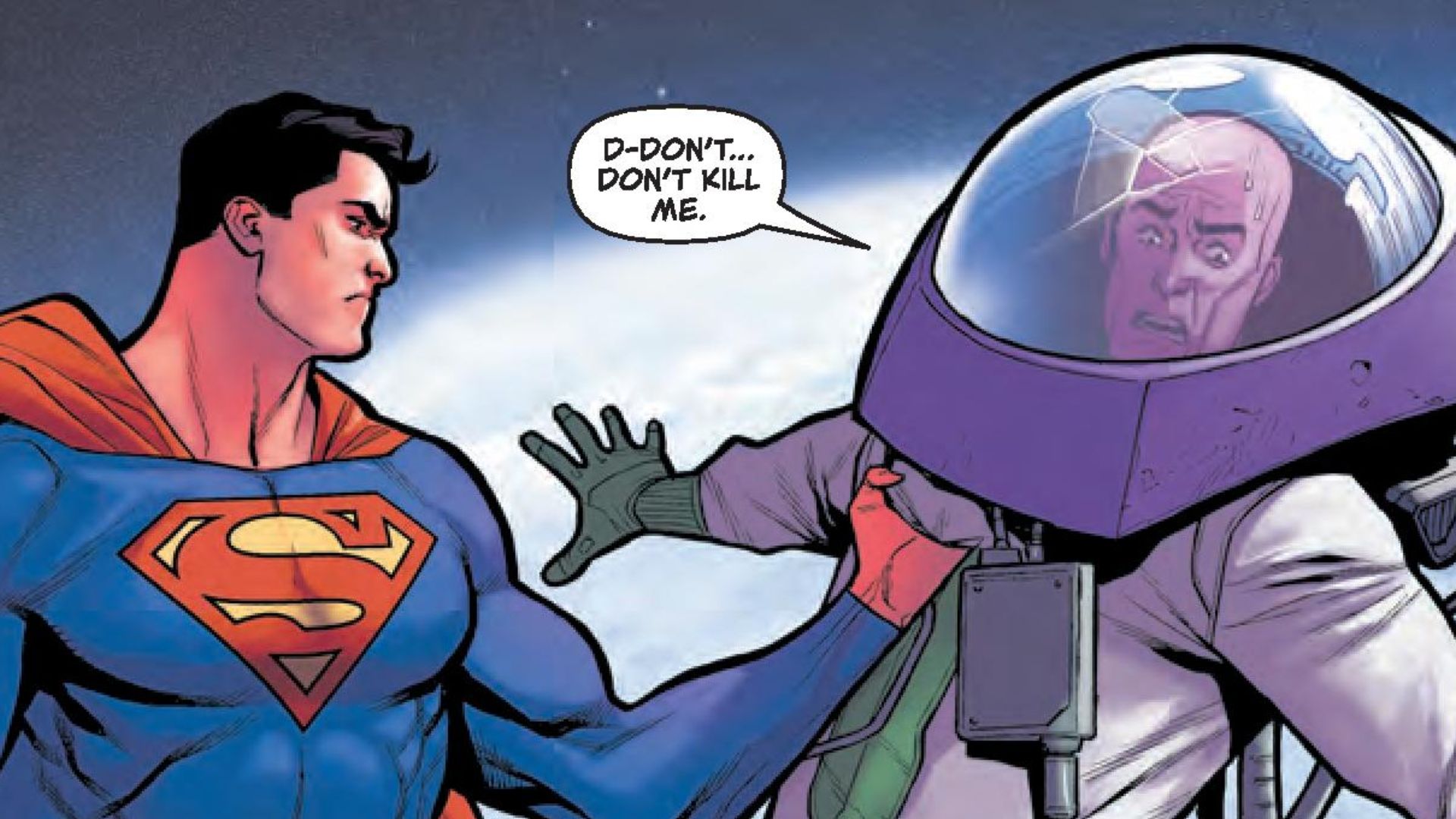
There was a time that the most heinous of Lex Luthor's plans involved revealing Superman's secret identity to the world. But now, with Superman himself having revealed his double life as Clark Kent, Lex has got another plan in mind; restore the secret of Superman's human identity, and make knowing it a psychic danger to the masses. It's all part of Luthor's nefarious Project Blackout scheme, and it all goes down in December 27's Action Comics #1050.
Action Comics #1050 is written by Phillip Kennedy Johnson, Tom Taylor, and Joshua Williamson; drawn by Mike Perkins, Clayton Henry, and Nick Dragotta; colored by Frank Martin; and lettered by Dave Sharpe. Ahead of its release, Newsarama sat down with the trio of Johnson, Taylor, and Williamson to get into what goes on with the characters in the issue.
Read on to hear what they had to say, but do so with caution...
Spoilers for Action Comics #1050 follow
Grant DeArmitt for Newsarama: Joshua, last time you and I spoke, we were talking about the end of Dark Crisis. I want to start by asking: what's the difference between writing a story like Superman and one like Dark Crisis?
Joshua Williamson: Dark Crisis was a beast in comparison. We've all worked on books that have huge ensembles; that is a very different beast. I was able to focus on this series; I was able to just focus on Clark and Lex. When I was doing Dark Crisis, it was like, here's the multiverse and all these other pieces. All these different voices were involved with that one.
When we talked the other day, I was talking about Dick and Slade and Mr. Terrific. On every page, there is so much going on. With [Superman], it was fun to let it breathe more and focus on the voice of just those two characters. And so I think that's the big difference for me between the two, was being able to let this one breathe a lot more.
But I mean, Crisis events are their own beast. Scott [Snyder] and I used to talk about this in Metal, and Metal was its own beast. There's a huge amount of information you expect to be on every single page, whereas doing something like Superman, I was able to make it more about character than stuff happening.
Get the best comic news, insights, opinions, analysis and more!
Nrama: On the subject of characters, Philip, your Action Comics run featured Clark leaving Jon on Earth while he went off to save Warworld. Now that Clark is back, how has their father/son dynamic changed?
Phillip Kennedy Johnson: Well, they love each other as much as ever, and Superman values his relationship with his son as much as ever. The years he lost with Jon continues to be a tender spot for Clark. We've seen it reflected in a lot of ways, the most obvious one reflected in the Warworld saga is the deep connection that he forged with the kids that met there.
They're roughly the same age as Jon when he left Earth. [Clark] really feels that loss, so he became very close with those kids. Now he's returned to Earth with them in tow because they needed him and they wanted to stay with him rather than go back off into space with no one, but Jon is there, too, alive and well.
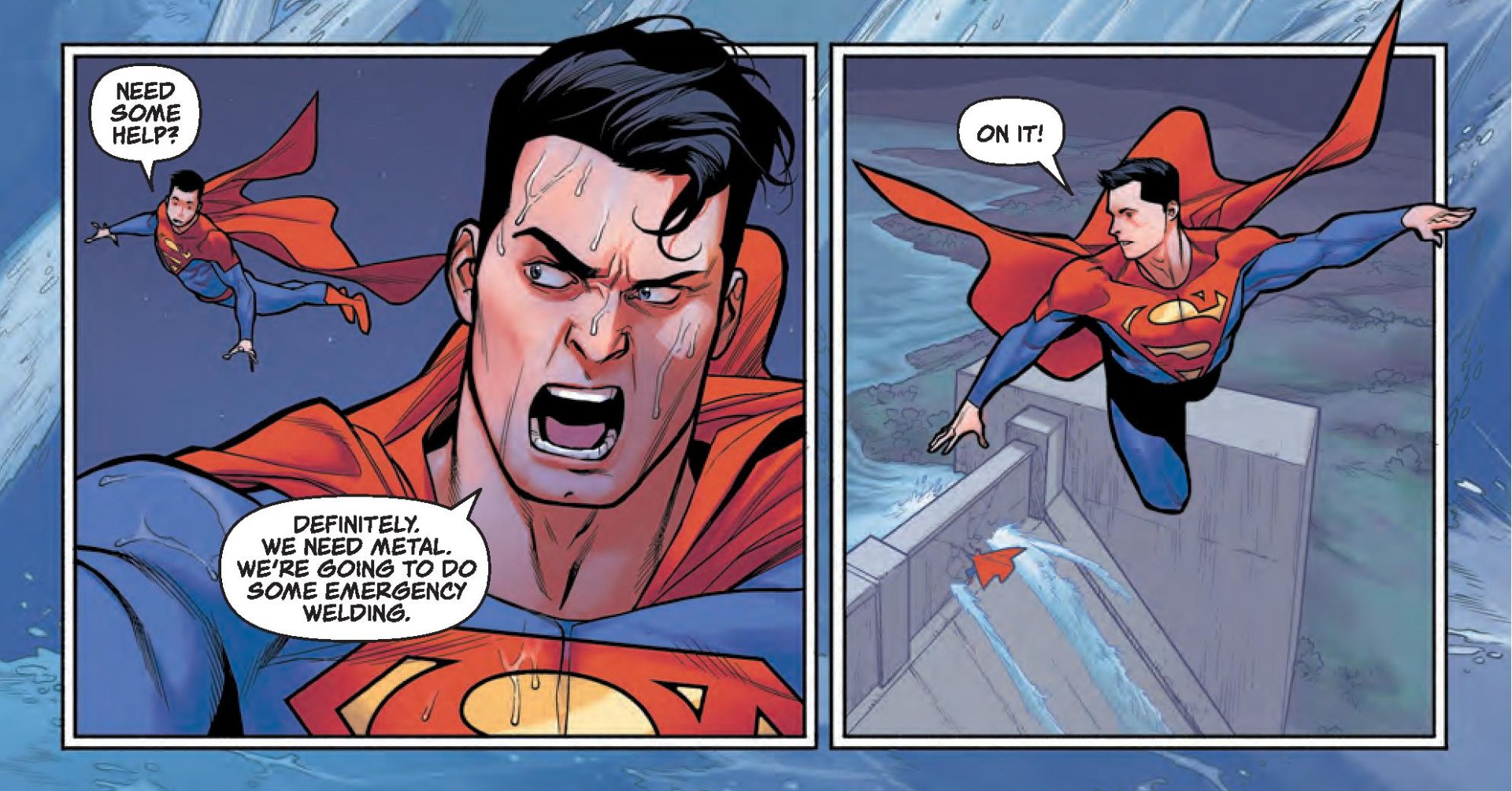
That makes for a really interesting family dynamic between Jon and the kids, but also between Clark and Lois and everyone. There's a much more complex, but also potentially much richer, kind of family dynamic in the house now.
Nrama: Is there any kind of resentment there? You know, a kind of 'You weren't here and we needed you' feeling?
Johnson: When I first started writing the stuff, there was going to be some resentment. Jon went off to be with the Legion and then came back and lived in this world where his dad is, you know, Jesus Christ with superpowers. And everyone looks at Jon like, 'Oh, you must be really incredible, because your dad's the best ever.' He has this impossible standard to live up to.
I imagined that he might have some resentment about that when he came home, this chip on his shoulder about that. But when I actually set out to write it, it just didn't work. Jon and Clark are made of the absolute best of humanity. These are not the kinds of people who have these petty squabbles that you and I might have. So no, there's no resentment between them at all.
I am really interested in Jon's relationship with the kids now because, again, Jon and Clark are the best. I want to see how they all play off each other. But as far as John being resentful of his father? I don't see how that could ever happen.
Nrama: Understood. So Tom, last time you and I spoke, we talked about the collaboration between you three. Can you tell me about the origins of Project Blackout, which is Luthor's plan for Action Comics #1050?
Tom Taylor: I can't remember exactly which call it was, but it was exactly like this one. I was sitting on the couch just over there.
Williamson: You had a giant whiteboard right here, remember?
Taylor: Oh yeah.
Johnson: I remember we were talking about different ways in which Lex might win, how we might do it. I think Josh or one of you guys was talking about needing some kind of a telepath for it, and I was like, 'Hey, I got one of those guys!'
Williamson: It was really this very organic reshuffling of things and things kind of coming together. It was a good experience, yeah.
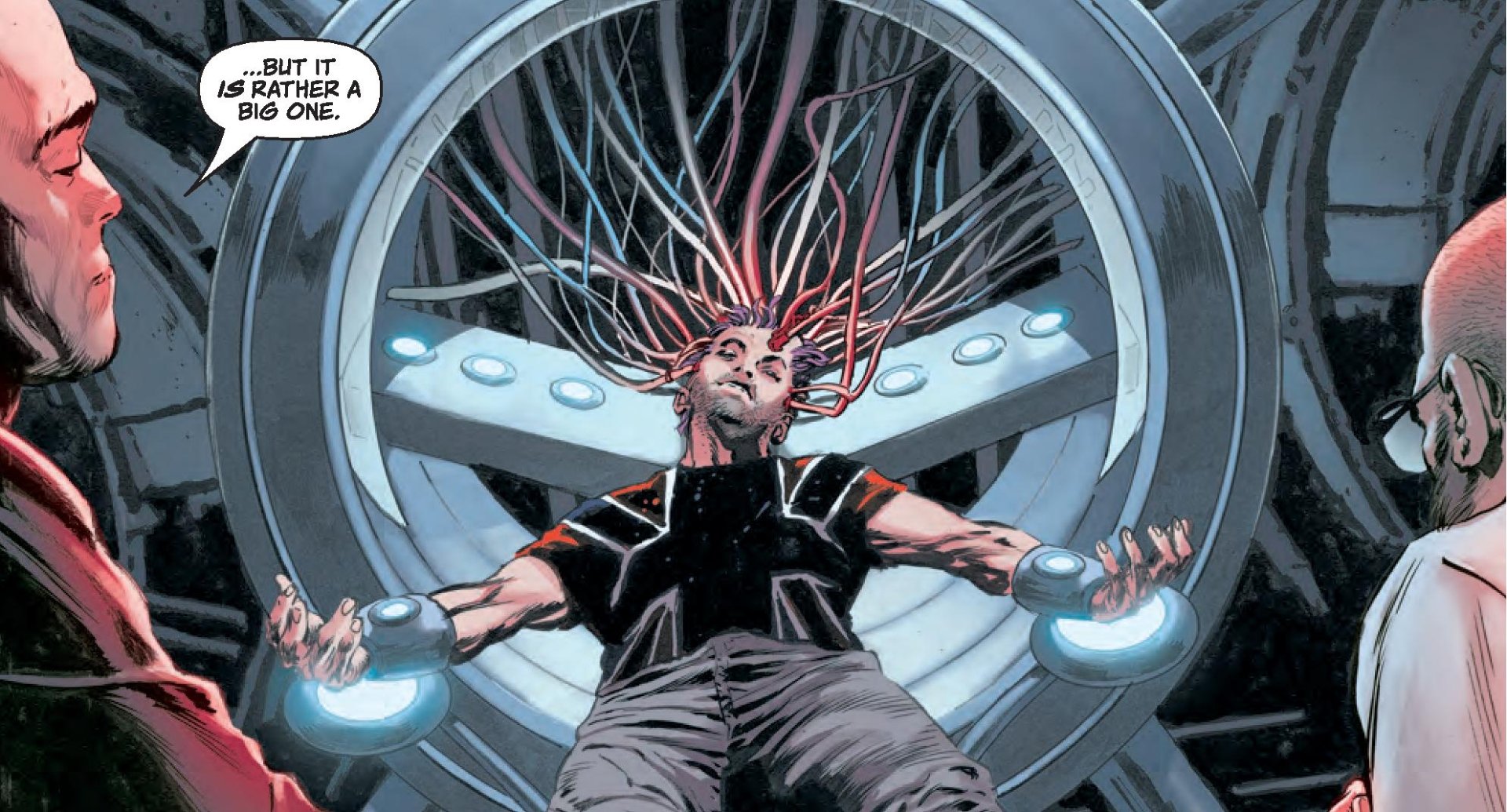
Taylor: It felt great because we realized we built this stuff heading into Action Comics #1050. We built all this stuff with Jon and Kal-El and we had these devices, and we wanted the secret identity thing to work and be believable. It couldn't be, 'Oh, it was magic.'
It felt like we'd always planned it; having Manchester Black and the devices that Bendix had put in people's heads, then bringing all that together and having the technology of Warworld to amp it up. It all just felt right. Then we had the name, Project Blackout, and then we were off.
Nrama: I want to circle back to Lex because there's a line in this story when Lex admits that the world needs a Superman. That's a huge moment, in my mind, because it's been the antithesis of his character for so long. Joshua, what makes Lex admit that?
Williamson: Well, the first time he said that wasn't here; it was in Batman, in the aftermath of Death Metal. There's a scene where Lex and Bruce are sitting out on a patio having this dinner, and Lex is being very Lex. Lex is such an egomaniac, but that was the tipping point for him, the stuff with Perpetua. For Lex to admit that the world needs Superman is a big thing.
With Perpetua, Lex allowed his ego to get the better of him. He made a deal with the devil and he lost. He got tricked, and on the other side of that, he had a moment of reflection. In that moment, he realizes the truth about Superman.
But his ego's not going to let him get out of the way. He can't completely go, 'Oh, you know what? I'm going to get out of the way of this person because the world does need Superman and the world is better because he's here.' He can't completely let go. He still has to have his hand on it somehow; he still has to find some way to manipulate it.
Nrama: I know we're winding down here, but let's keep talking about villains. Philip, you've been setting up John Corben, AKA Metallo, as Action Comics' next antagonist, and we see him change bodies in Action Comics #1050. What kind of villain will Metallo be moving forward?
Johnson: All the best Superman villains are the antithesis to Superman, each one in different ways. Lex obviously is considered the opposite of Superman forever because he's human. He could have been the best of us as a human himself, but, when the alien comes and shows us how best to be human, Lex becomes the big foil. When I was writing Mongul, I came at it thinking, 'If Superman is the champion of the oppressed, we're going to make Mongul this intergalactic slaver whose cult of personality on Warworld is centered around dominance.'
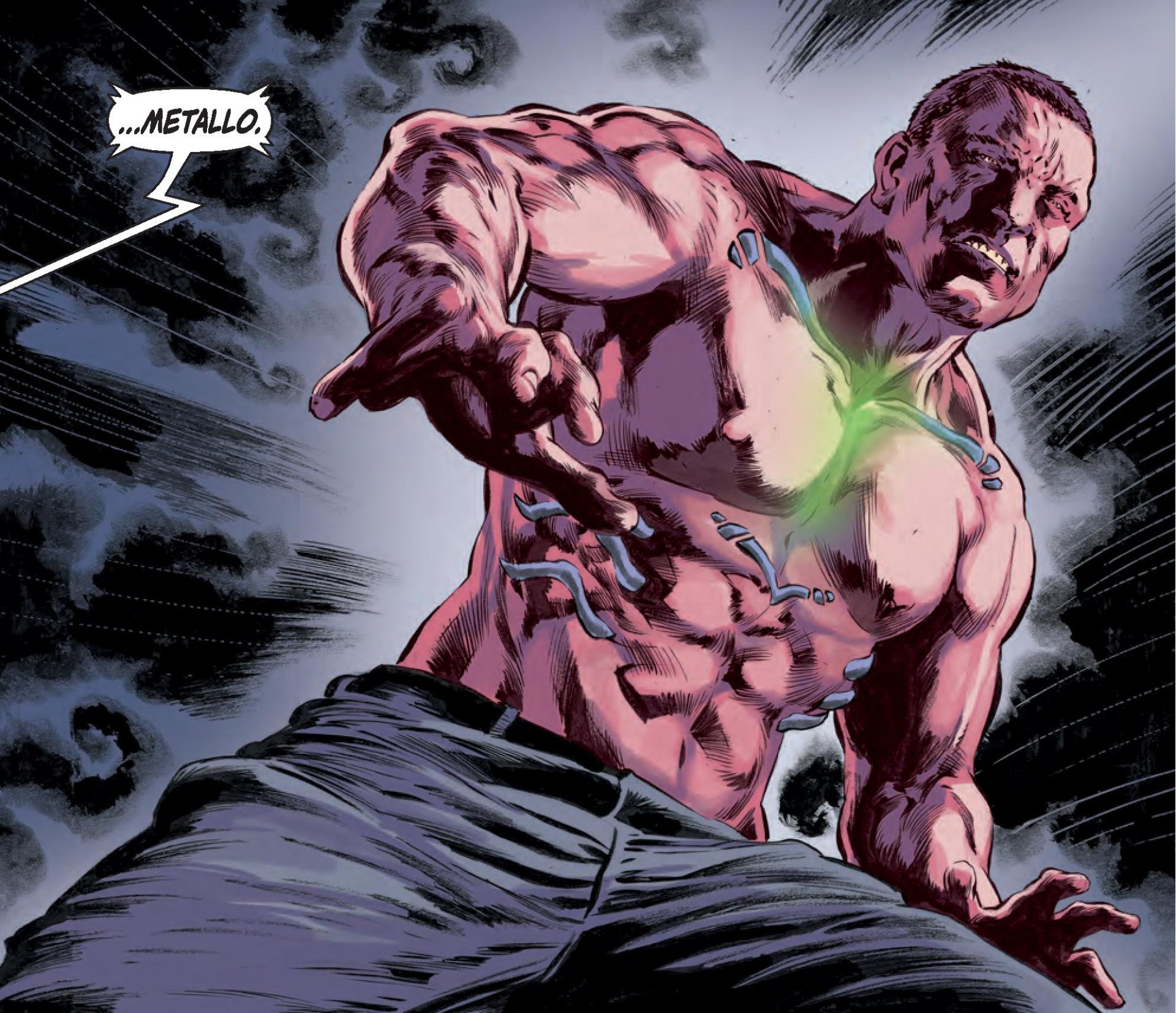
My way into Metallo was all the iconography that we have of Superman repelling bullets. He's the bulletproof hero; he's the opposite of the gun. For Metallo, I envisioned this good kid who did okay in school, had a sister he cared about, liked to draw. Then at some point, his dad brings him a gun and tells him to hide it. Instead of hiding it, he keeps it and he's obsessed with it. He's addicted to it. While Superman is elsewhere learning to be the consummate hero, John Corben is becoming more and more of that gun.
Throughout his life, he turns more completely and more perfectly into a gun himself. So to me, he is, in a different way, the opposite of Superman. But he's also not a supervillain in the way that some others are. He's a guy who lost his humanity and wants to be that kid again, who wants to be somebody who was on his way to being okay.
He's always trying to reclaim his humanity, and he's very self-conscious about not being human. He's a monster and he hates being a monster. So he's this tortured, broken person who now is armed with this insane Warworld technology. We're going to get a much scarier, more conflicted, more Cronenberg take on Metallo.
Nrama: Excellent. Alright Tom, let's end with you. This issue ends with Jon and Clark's secret identities restored, and Jon Kent does not seem upset about it. In fact, I got the idea that he sort of likes being anonymous. Am I right? And how is that going to affect Adventures of Superman: Jon Kent?
Taylor: Yeah, absolutely. He feels good about it. We see him getting a coffee and they spell his name wrong and he's like, 'This is perfect.' That's the first thing we see in Adventures of Superman, him enjoying his freedom, him just out in the park with Jay.
And unfortunately, well… I might be giving something away here, but everyone remembers that Jay is the boyfriend of Superman, though they do not know who Superman is. So Jay says to Jon, 'Oh, this the most free you've ever felt? I'm in my secret identity of 'guy who wears too many layers and a hat and sunglasses.''
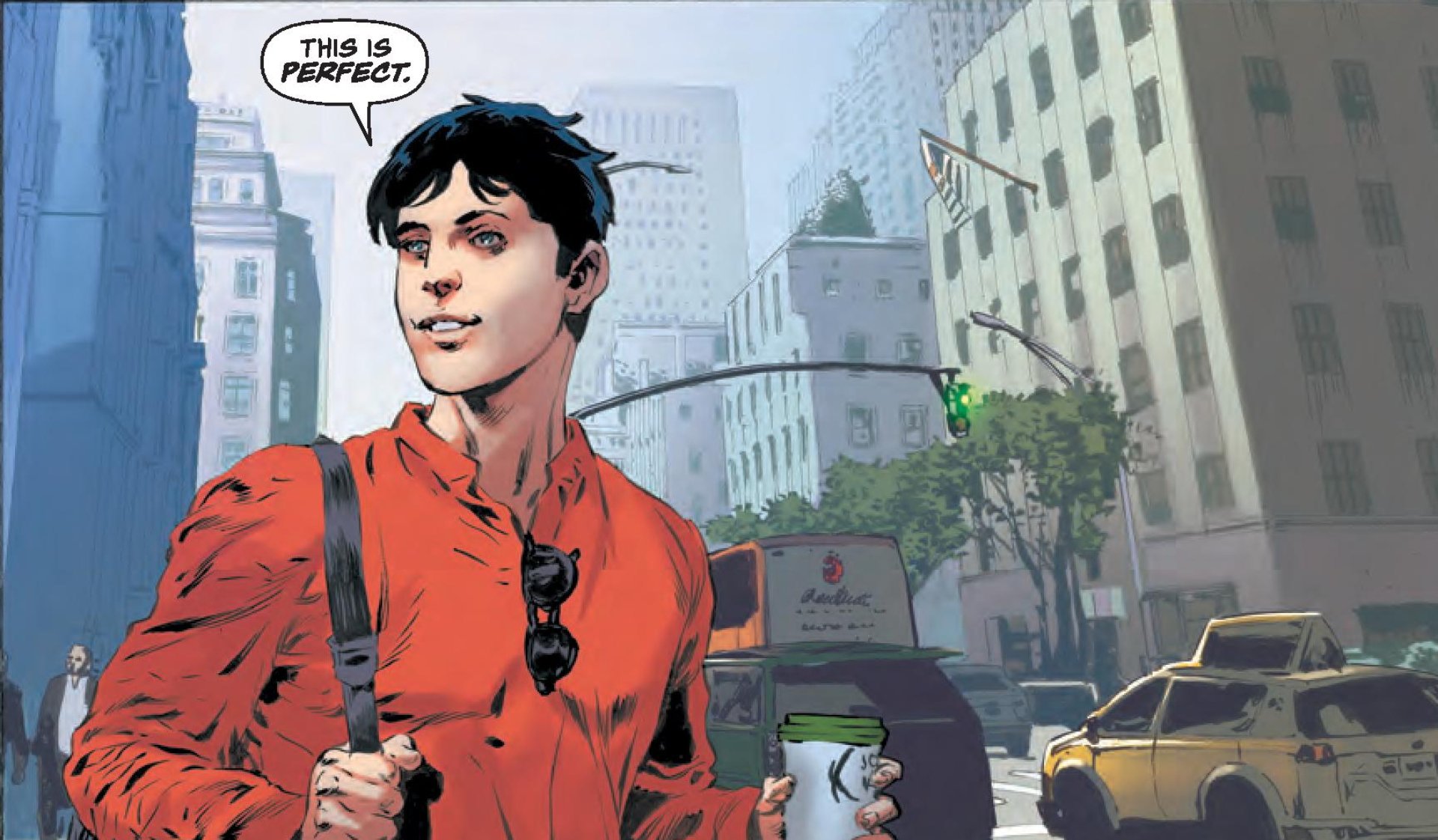
But, no, Jon, he loves it. He's come back from everything he's gone through - being tortured, being imprisoned, being stuck by Ultraman, being in the future, being the most famous person on the planet, being this lightning rod for so many terrible people who hate what he's done. There's been no separation between Jon and Superman, no way that he could hide.
And now, finally, he can hide in plain sight. He can walk down the street without everybody sticking a camera in his face. So this is the most free he’s ever felt. This is a guy who can fly to other planets and fly through space, but this is the most free he's ever felt. And so this gives him something really unique.
Want more exciting stories of the Man of Steel? Check out Newsarama’s curated list of the best Superman stories of all time.

Grant DeArmitt is a NYC-based writer and editor who regularly contributes bylines to Newsarama. Grant is a horror aficionado, writing about the genre for Nightmare on Film Street, and has written features, reviews, and interviews for the likes of PanelxPanel and Monkeys Fighting Robots. Grant says he probably isn't a werewolf… but you can never be too careful.


